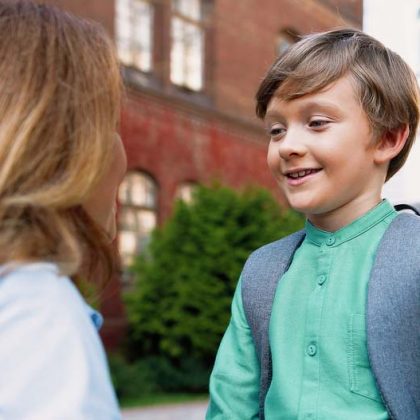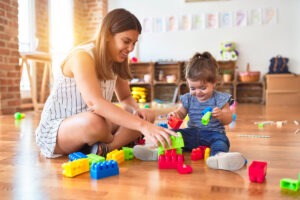First day of school jitters are normal for both children and their parents. Entering a higher grade, in a new classroom, with a new teacher can give most kids a few butterflies.
For children moving up in schools or programs, like Preschool to Kindergarten, the transition can result in experiencing even stronger emotions when it’s time to go back to school.
As parents, we want to make those transitions as smooth as we can for our kids for many reasons. It’s important to us that our children feel happy, confident, and secure during drop off and throughout their school day.
School transitions are also important for children’s academic future. Research has shown a strong correlation between a child’s cognitive and social competence before kindergarten and later academic success.
Follow these 5 strategies to help your child have a stress-free, successful school transition so they can focus on learning, making friends, and having fun!
#1: Keep Up Communication
Communicate with your Child
Establishing a clear line of communication between parents, children, and teachers can help facilitate a smooth transition into a new school setting.
According to the National Association for the Education of Young Children (NAEYC), “Positive relationships between kids and adults enhance children’s ability to learn and help them become more comfortable in their surroundings”.
No matter your child’s age, it’s important to talk to him or her about an upcoming school transition. FInd a time when your child will be most attentive. For example, at bedtime. Be present and adjust your language so your child can understand. Focus on “feeling words” like excited, nervous, happy, and scared.
Expressing emotions and having conversations can build your child’s confidence to communicate with others – an important school readiness skill!
Communication with a New Teacher
Both children and parents can closely communicate with their teachers to help the new school year start smoothly. Be sure to try and attend any events as school approaches like open houses, orientations, or meet-the-teacher night.
Meeting and building a close relationship with a new teacher can help your child feel supported as he or she encounters new experiences.
Talking to your child’s teacher about their preferred method of communication can help you establish an open channel that can continue through the transition of the new school year. Parents can give teachers valuable input on what seems to comfort their child or help ease transitions. And teachers can communicate details about how he or she is adjusting to the changes, so parents can talk about these things at home.
Remember- keeping an upbeat attitude while talking about school transitions can help your child think positively too!
#2: Give Your Child a Role
Transitions can be tricky, especially for children. It’s hard for them to understand the concept of time, and they can feel like they have little control or say in what’s going on in the world around them.
Go back-to-school shopping together! Bring your child’s list of school supplies needed and ask him or her to help you find them in the store, then check them off. Involve your child in packing their backpack and lunch the night before the first day.
Offering choices is another way to help your child feel a sense of control to alleviate the stress of a big school transition. Which backpack, lunchbox, snacks, and first-day outfit he or she has are great things to give your child choices of.
#3: Prepare through Play
Role-playing is a fun way to help prepare your little student for the next step in their educational journey! Pretend play has been shown to enhance a child’s social emotional development, which is a critical school-readiness skill that helps build a foundation for learning.
Play “school” at home with your child, incorporating siblings or even stuffed animals and dolls. Work on talking about some of the things that will be different at your child’s new school setting into the play scenario. For example, for those entering Kindergarten, you can talk about how the classroom is bigger or that there are more kids in the class.
Children of all ages might enjoy drawing a picture that shows what they anticipate their new school will be like. To encourage communication, avoid asking too many questions and instead, comment on the details of your child’s illustration!
#4: Read about It
Look for stories related to your child’s upcoming school transition. For example, Natasha Wing’s The Night Before Kindergarten. Books are a great way for children to learn about a new experience so they feel more prepared to enter it.
Exposure to literacy, paying attention/listening, and using critical thinking skills while reading are also important skills for your child to have in order to successfully participate in the classroom.
#5: Find a Familiar Face
If you have concerns about your child’s communication skills or ability to make transitions, seeking help early is best. Therapy Works offers Speech Therapy both in person (in Illinois, Michigan, and Ohio) and through teletherapy. If you would like to learn more, or discuss your child’s specific needs, please don’t hesitate to reach out to TherapyWorks!








